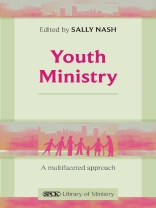This book, written by experts in the field, explores the role of the youth minister by looking at a range of metaphors, such as ‘flawed hero’, ‘visionary architect’, ‘party planner’ and ‘guardian of souls’.
Each chapter takes one of these metaphors as a central theme, offers biblical and/or theological reflection on this aspect of youth ministry, explains the relevant theory and the necessary skills, uses real-life stories from practitioners to bring the metaphor to life, summarizes the key principles and values, gives questions for reflection and makes suggestions for further reading.
Table of Content
List of contributors vii
Preface xi
Introduction xiii
Sally Nash
Young people today xiv
Shalom xv
Youth ministry today xvi
Reflecting on your practice xviii
The rest of the book xix
1 Politician of integrity 1
Paul Nash with Steve Hirst
Integrity as a virtue 2
Definition of a politician of integrity 3
Tests for the youth worker of integrity 8
Conclusion 9
Questions for reflection 9
2 Flawed hero 11
Jo Whitehead
Being a role model 13
Values of Christian leadership 14
Developing and releasing others 17
Leadership styles and roles 17
Use of power 18
Authenticity 19
Questions for reflection 21
3 Visionary architect 22
Simon Davies
In him we live and move and design the building 23
The strategic planning process 24
Conclusion 32
Questions for reflection 32
4 Community builder 34
Nick Shepherd
Christian communities of practice – sensing, shaping and sustaining faith 35
Creating places to be Christian: youth groups as communities of practice 39
The youth worker as community builder 41
Questions for reflection 44
5 Empowering liberator 46
Bob Mayo
Setting the scene 46
Strategic liberalism 48
Empowerment 48
Narratives 50
Liberation 52
Postscript 53
Questions for reflection 53
6 Party planner 55
Jean Harper
Setting the scene 55
Planning a celebration event
for and with young people 58
Programme planning 60
Conclusion 64
Questions for reflection 65
7 Boundary marker 66
Sharon Mc Kibbin
Being a boundary marker 67
Facilitation skills 69
Challenging behaviour 71
Roles 73
Conclusion 76
Questions for reflection 76
8 Mediating mirror 78
Sam Richards
Introduction – reflections in ‘mirrors’ 78
Identity 80
Self-esteem 80
Identity development in adolescence 82
Strokes 83
Body image 84
Questions for reflection 86
9 Guardian of souls 88
Jo Whitehead with Sara
Reynolds
Spiritual and faith
development 89
Relationship – being there 90
Community – being together 92
Encountering – being with God 93
Power and participation – being involved 94
Learning and growing – being a disciple 95
Questions for reflection 96
10 Odyssey guide 98
Sally Nash and Bev Palmer
Young people’s journeys 99
Being an odyssey guide – qualities and tools 100
Vocation 102
Good practice 104
Journeying with ourselves 104
Conclusion 106
Questions for reflection 106
11 Compassionate presence 108
Robin Barden
Introduction 108
The Good Samaritan and compassion 109
Compassion as an emotion 109
Were the Priest and Levite simply uncaring? 110
The context in which the parable was told 111
The skills section 113
Conclusion 116
Questions for reflection 116
12 Well-watered tree 118
Iain Hoskins
Historical context 119
Introducing self-care 120
Caring for the carers – a dilemma 120
God and the Church 122
Sharing as self-care 122
Feedback as self-care 123
Making space as self-care 123
Conclusion 125
Questions for reflection 126
Appendix: Youth ministry role
preferences and passions indicator 128
Index of biblical references 133
Index of subjects 134
About the author
Revd Dr Sally Nash is Director of the Midlands Institute for Children, Youth and Mission based at St John’s College Nottingham and is also a self supporting minister in Hodge Hill Church in Birmingham and a companion of the Northumbria Community. Sally’s main work is teaching, writing and research in the fields of ministry, work with children and young people, spirituality and chaplaincy. Outside of work Sally enjoys playing golf, supports Spurs, blogging and walking.












